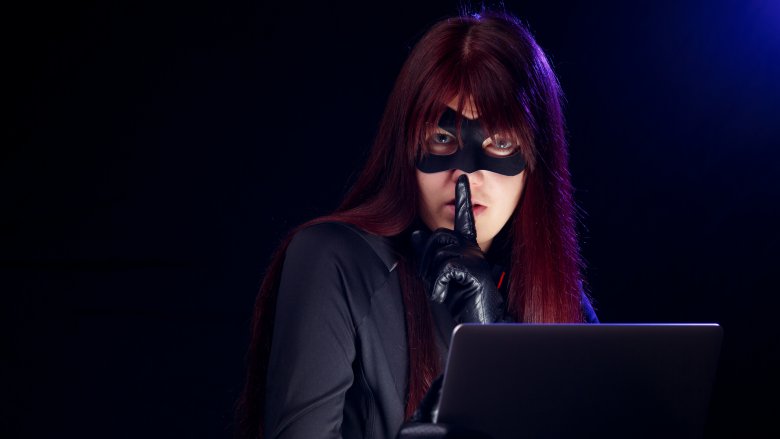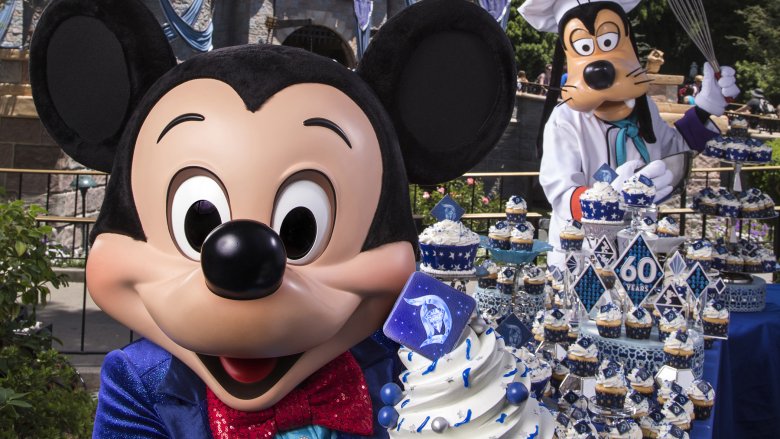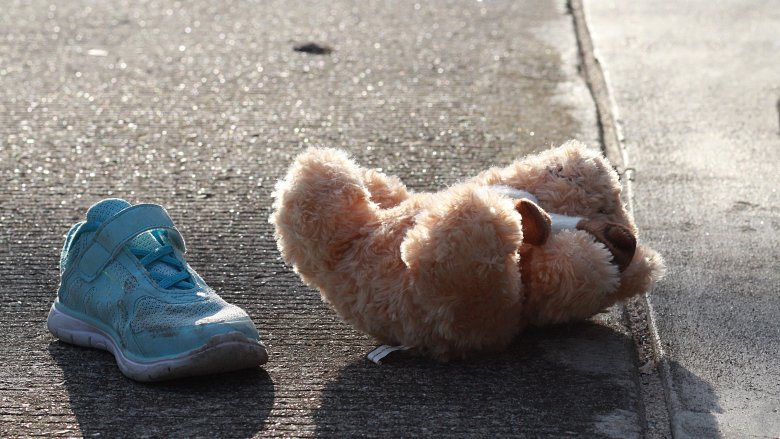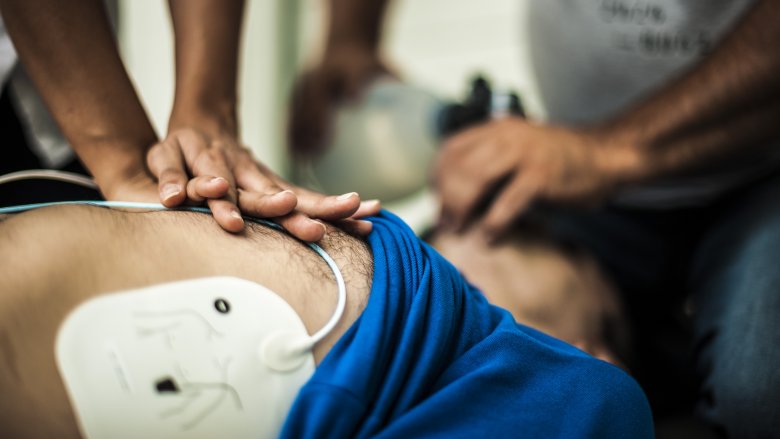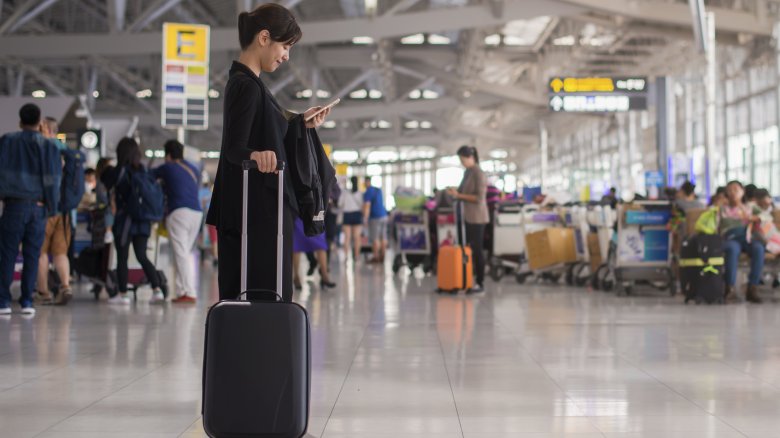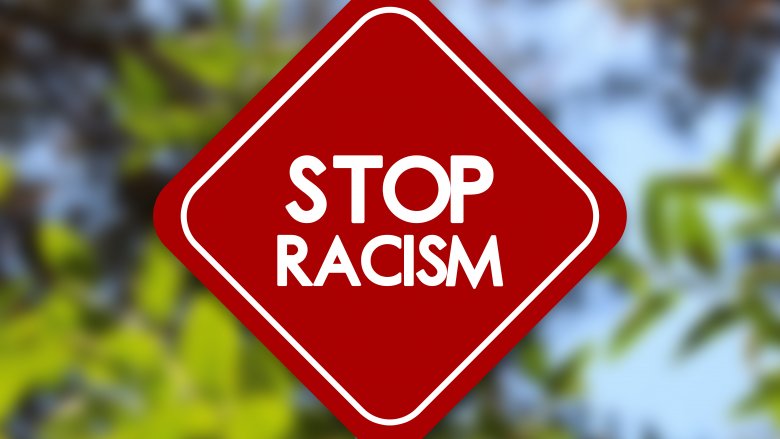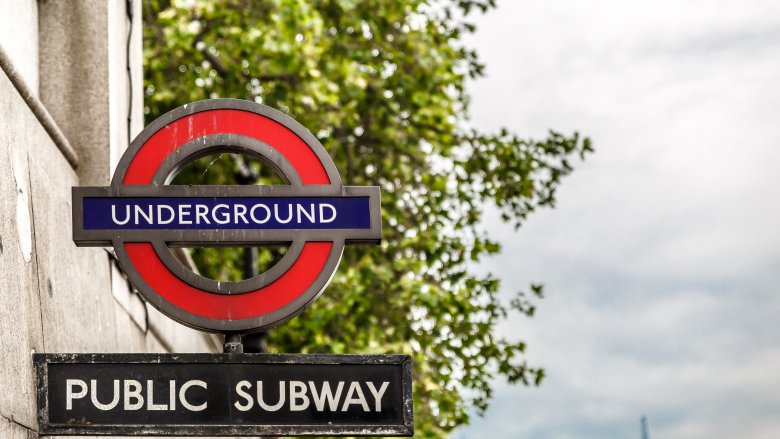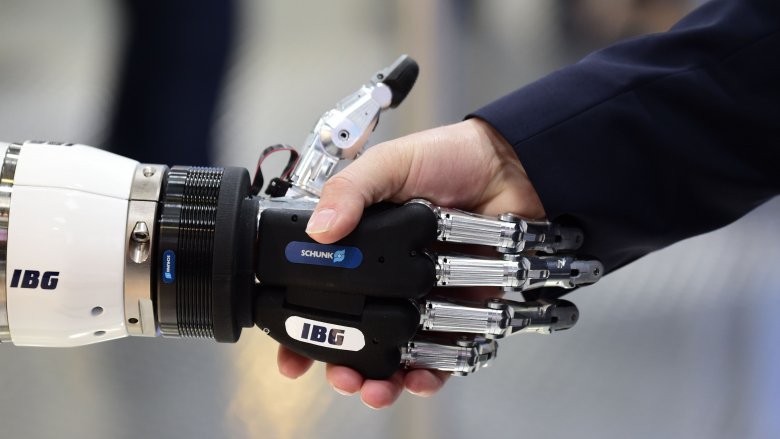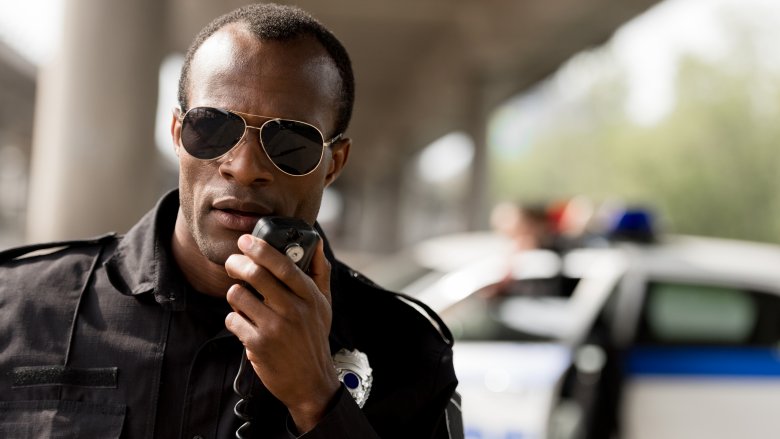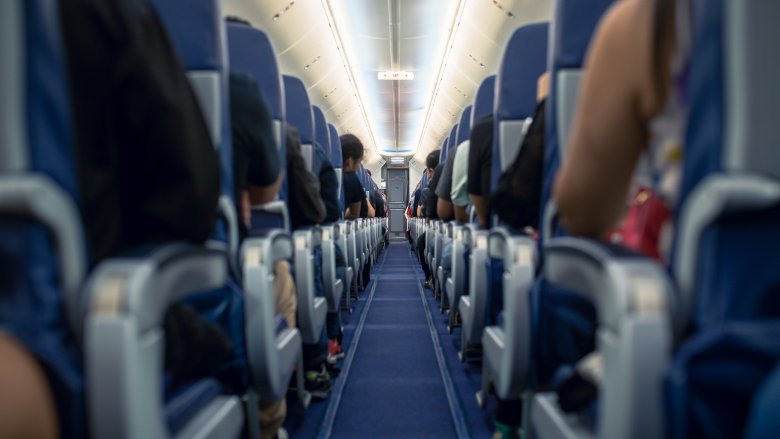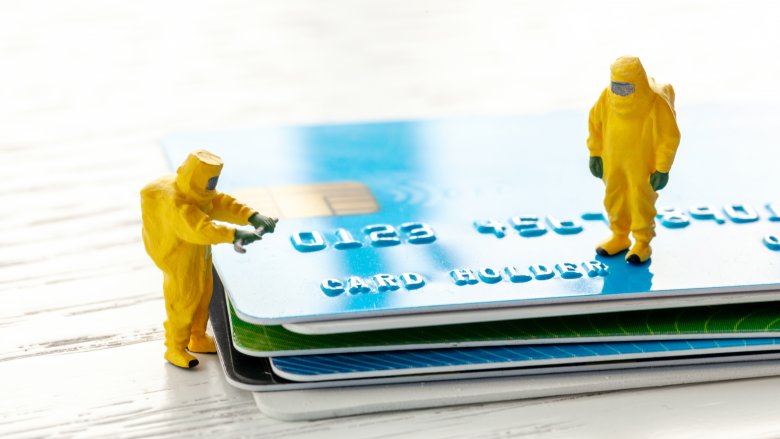Secret Code Words That No One Is Supposed To Know
If you were one of those elementary school kids who learned Morse code just to tap out naughty phrases to your friends in class, then you know just how fun secret codes can be. Whether you're working, standing in line, or you somehow walked into the wrong party, having code words is a great way to inspire conspiratorial giggles among your friends, no matter what your age or profession.
Sometimes, though, code words serve a less humorous purpose, particularly when it comes to safety issues. For example, if there's a suspected fire at the train station, the workers don't want to start a mass panic by yelling out "Flame on!" — particularly if the situation isn't confirmed yet — and in times like that, secretive phrases really come in handy. Most of these code words are used for good purposes, while others are a little more disturbing, but they all have one thing in common: You've probably heard them in the background before and had no idea they were code words.
Were you called a treasured guest at Disneyland?
Hopefully not, because it isn't the compliment it sounds like.
According to a Dish Nation episode, the delightful label "treasured guest" is how Disneyland workers refers to customers who are unpleasant and difficult. Bet you never knew Mickey could be so sneaky, huh? Some people have noticed this euphemism in action, but according to Disney Dining, it's mainly employed for diplomatic purposes rather than gossip: Disneyland workers are forbidden from using insulting language due to all the kids around, so calling the jerks "treasured guests" is a nice way to warn coworkers.
This isn't the only code word you'll hear at the world's most colorful playground, though. For example, people who urinate in the swimming pool activate a "Code Winnie," hardy har har. (There's no mention of a "Code Pooh," so hopefully that isn't a frequent occurrence.) Broken rides are Code 101s, and fixed rides are Code 102s. There's also the so-called "White Powder Alert," but don't worry, it's not about cocaine. Rather, it refers to when people attempt to spread a loved one's ashes on the park grounds, which (like it or not) is illegal without Disneyland's permission. And honestly, when Grandpa Robbie said he wanted his ashes sprinkled from the top of the Matterhorn, he probably meant the real one in the Swiss Alps, not the roller coaster imitation in Anaheim.
A child goes missing at the store...
For a parent, there are very few things scarier than the threat of child abduction, and that's why many big chain stores employ something called Code Adam. This is activated when a parent reports that their kid has gone missing, at which point associates will move to monitor the building's exits, watching carefully for any young ones matching the lost child's description — particularly if that child is accompanying a different adult.
The procedure was first adopted by Walmart in 1994, over a decade after a 6-year-old boy named Adam Walsh was abducted at a Sears. While the exact circumstances surrounding the boy's abduction have never been fully explained, it seems likely that the adult lured him to the parking lot by promising candy and toys: 16 days later, according to Time, Adam's head was found in a canal off the side of the Florida turnpike. The alleged murderer, a serial killer named Ottis Toole, confessed to the murder (and recanted his confession) on two occasions before dying in 1996.
Four years later, Adam's father, John Walsh — the co-founder of the National Center for Missing & Exploited Children — became the host of the TV program America's Most Wanted.
What do nurses mean by Code Blue, exactly?
A lot of crazy stuff goes down in hospitals. Sure, the antics you see on medical TV shows like Grey's Anatomy are pretty divorced from reality, but ask any nurse how their day was and you'll hear a whole cocktail of dramas, near-catastrophes, and disputes. Because emergencies aren't exactly uncommon in a place with a whole unit called the Emergency Room, medical staff use all kinds of jargon to quickly convey information without alarming the patients, and color codes are the standard. For example, it is generally understood that "Code Blue" refers to cardiac arrest, according to the journal Nursing. While heart attacks (hopefully) aren't a daily part of your home life, these instances are frequent enough in health care settings that many facilities employ rapid response teams, called "Blue Code" teams, according to the World Journal of Emergency Medicine. Of course, the precise meaning of Code Blue can vary depending on region or hospital. For example, the Hospital Association of Southern California simply lists it as "adult medical emergency."
Not all emergency codes are used so frequently, but they're usually fairly intuitive. Code Red, for instance, refers to a possible fire in the building. Code Pink refers to an infant being abducted. Code Silver means a potentially hostile person is armed with a weapon. You get the idea.
The problem isn't your computer. It's you.
Face it, if there's one thing that tech-savvy geeks love to do, it's make fun of people who don't know how to use their computers properly. That may sound mean, but honestly, just imagine spending three hours Skyping with a furious, screaming relative about how their computer won't turn on anymore, and hasn't turned on for weeks ... only to find out that they had it unplugged from the wall the whole time. These situations are painful enough in daily life, but if you're enough of a glutton for punishment that you work in tech support, a sense of humor will become your lifeblood.
When it comes time to diagnose customer problems that have nothing to do with their "stupid" computers, Lifewire says tech workers will often communicate to each other — or you — in careful codes that sound real but are actually about the Luddite caller. Like what? Try PEBKAC, an acronym standing for Problem Exists Between Keyboard and Chair. Ouch. There's also Code 18 — i.e., "Sorry, but it seems like you have a Code 18, and that's not my specialty" — which means the problem is 18 inches from the screen. Bigger ouch. There's also EEOC for Equipment Exceeds Operator Capabilities. The meanest code word of all is ID-10T, which means ... well ... read it again and you'll get there.
A rather unpleasant airport experience
The one part of flying nobody enjoys is going through security. Between waiting in line, taking off your shoes, putting your laptop in a bin, and dealing with the increasingly draconian baggage policies of U.S. airlines trying to squeeze every penny out of you, it's no fun. One thing that certainly makes it even worse, though, is when a TSA officer leaps in front of you and yells, "Code Bravo, freeze!"
According to the Telegraph, Code Bravo signals a general security issue at the airport and can be employed by officials as a way to scare travelers — yes, really — to make it easier to figure out who the troublesome party is. Basically, they want to shut down a checkpoint quickly and efficiently by making everybody ... um, freeze. Fair enough. According to the New York Times, though, this is often done during off-peak hours once or twice annually as a simple training exercise so TSA officers will be ready to roll when or if a real threat emerges. Technically, if this happens to you, you're not legally required to do your best Mr. Freeze impersonation, though you might get some mean looks if you don't stand still. But hey, you're the one who bought the plane ticket and are spending $20 on a dollar menu hamburger at the airport, right?
1488 is a racist Nazi dog whistle
Most of these codes are useful security measures. This code, on the other hand, is a horrifying reminder that white supremacists are still a danger to the world today.
See, while the numbers "14" and "88" might look innocuous enough, they're actually used as a dog whistle for neo-Nazis. According to the Anti-Defamation League, the 14 refers to the so-called "Fourteen Words" slogan, a sentence first written by white supremacy terrorist David Lane, which basically just summarizes his disturbing, racist worldview. The 88 is based on H being the eighth letter of the alphabet, so 88 is supposed to stand for "Heil Hitler." These numbers — sometimes used apart, but usually together — signify a person's racist, white supremacist viewpoints. Variations of 1488 have been stealthily employed in tattoos, signs, snuck into merchandise (for example, pricing an item at $14.88), and often hidden within a person's seemingly normal email address or social media handle, like 14JohnDoe88.
Once you know the code, it's terrifying to find it in unexpected places. For instance, the Fare Network reported that certain Russian football fans with neo-Nazi views came to a 2013 game wearing 1488 emblazoned on their T-shirts. Another example is the Pittsburgh synagogue shooter, who featured 1488 on his social media cover photo, according to Syracuse.com. These things are subtle, so keep an eye out.
Inspector Sands isn't the polite English gentleman you might think
When you're hitching a ride on the Tube, aka the London Underground, you might occasionally hear staff talking about a man named Inspector Sands, particularly if they're making an announcement that he's needed in a certain room. While this name brings to mind the image of a distinguished, monocled fellow who could perhaps compete with Colonel Mustard for the position of the yellow game piece in Clue, Inspector Sands is actually just a code word so staff members can inform each other of a fire situation without alerting the public, according to the Guardian.
It's not the same as yelling "fire" in a crowded theater, but it turns out that even casual conversations about potential small fires can cause mass panics. Hence, Sands to the rescue! When the situation is defused, don't be surprised to hear an announcement that "Inspector Sands has left the building." Phew.
The Independent confirmed that there are plenty of other code words used on the Tube, but sadly, they use numbers instead of fun names and are mainly just cleaning directions for the poor folks who have to mop up the grotesque messes found just about anywhere humans frequent. So when a janitor hears Code 1, they know they'll be wiping up blood, while Code 3 could refer to vomit, and so on.
Scientists support each other
As tedious as it sounds, new scientific advances are often made by taking a deep, hard look at somebody else's published scientific results. Whether you're debunking an old conclusion, proving it right, or building upon it, access to that published research can be key — and not every scientist has the dough to purchase the latest studies on a particular subject, especially if they don't have a wealthy organization funding them.
What's a researcher to do? Well, it's the 21st century, so the answer — of course — is to go on social media, post a link to the paper you need, and write "I can haz PDF." And then some other scientist who does have access will make a copy and send it over, and the request will be deleted.
Sounds goofy, sure. But it works. According to the BBC, the tag was invented by cognitive scientist Andrea Kuszewski, based on the popular "I can haz cheezburger" meme that often accompanied funny cat photos in the early years of the internet. Naturally, the publishers who hold the rights to these academic papers are pretty unhappy about this science piracy and argue that such paper-swapping is illegal, but Kuszewski believes that continuing the trend will change the way research papers are published, ideally resulting in a more open-access future. Form your own conclusion, but now you know the code word.
Man overboard! What do you say?
Unless you're a character in a slapstick comedy, falling off the side of a cruise ship is a surefire way to ruin a family vacation. This awful situation happens, though, so the various cruise ship companies out there have all developed code words for the crew to use whenever a passenger falls off the side. On Royal Caribbean cruise ships, Marine Insight writes that the term "Code Oscar" is employed three times in quick succession, followed by a location — e.g., "Code Oscar, Code Oscar, Code Oscar, off the starboard hull!" — ideally announced over the ship's radio system so all the crew can get involved in the rescue effort. Getting the word out quickly (and without all the non-overboard passengers freaking out) also makes sure the vessel slows down and gives time for the crew to grab flashlights and other things, depending on the situation. While Oscar is specific to Royal Caribbean ships, gCaptain says the international signal for someone going overboard is three blasts on the ship's whistle, which is Morse code for the letter O, followed by a vertical flare.
Other ships, according to the Telegraph, employ the code word "Mr. Mob" for "man overboard."
Police use an awful lot of 10s and 11s
When police are making arrests, investigating disturbances, or pulling people over, they communicate over a radio frequency that's accessible to the public. Yes, there really are people who hang out at home listening to police scanners, and while their reasons vary, police tend to employ over 100 specific codes to describe their actions, responses, and objectives, according to Business Insider — so if you want to get anything out of listening, you'll need to study up.
These codes are referred to as 10 or 11 codes, according to Radio Labs, and the one you might be familiar with is 10-4, which means "message received, understood." There are also a lot of penal codes, which seem to vary by department, state, and so on. The U.S. Department of Transportation has separate lists for codes employed by the Dallas Police Department and California Highway Patrol, and though they generally employ the same format, you can't always assume that something like 10-31 means the same thing in every jurisdiction.
Airplanes use complicated terms for mundane things
When you're sitting on an airplane, some of the coded statements pilots and flight attendants say to each other can sound like total gibberish if you're not in the know, but these odd phrases usually describe very boring, routine things. One phrase you've definitely heard before is "Doors to arrival and crosscheck," which may sound like like prep for an extraterrestrial attack, but is actually just someone (usually a lead flight attendant) informing the crew that the emergency escape slides attached to the doors have been turned off so they won't spring into action when the doors open, according to Business Insider. Then there are "landing lips," which refers to the quick freshening up that attendants might do — such as reapplying lipstick — right before landing, when they say their smiling goodbyes to you. Another seemingly weird occurrence you might've noticed is when two flight attendants cross paths, eye each other, and say "We've met." This might appear to be an adorable meet-cute from a romantic comedy, or perhaps a time-travel paradox, but the Telegraph says it's actually just them communicating that they're carrying out a visual check for seat belts. Yawn.
But wait, here's a good one! If your flight has ever been delayed due to a so-called "equipment change," guess what? The "equipment" in question is referring to the entire airplane.
Your card smells funky
Unfortunately, credit card fraud is an all-too-common occurrence in today's world, and that's unlikely to change anytime soon. As a result, merchants and cashiers sometimes need to investigate a person's card to make sure nobody's getting cheated. This is particularly necessary when a few key warning signs light up, like signatures that don't seem to match, a "lost or stolen card" message on the computer, and so on. According to Total Merchant Services, some well-trained cashiers might investigate this potential fraud situation by dialing up the credit card issuer in question and making a "Code 10" authorization request.
The Code 10 operators on the other end of the line, as CreditCards.com explains, are trained to to figure out if credit card fraud is occurring, and to help the cashier or merchant contact law enforcement if necessary. In the end, whether fraud is happening or not, it's a lot easier to tell a customer (or a vile thief!) that you're making a Code 10 request than it is to call them out in front of the whole checkout line.
